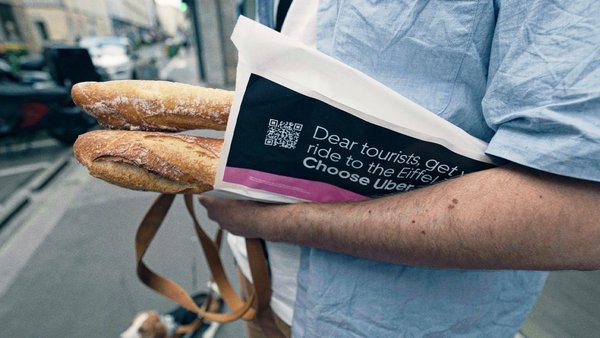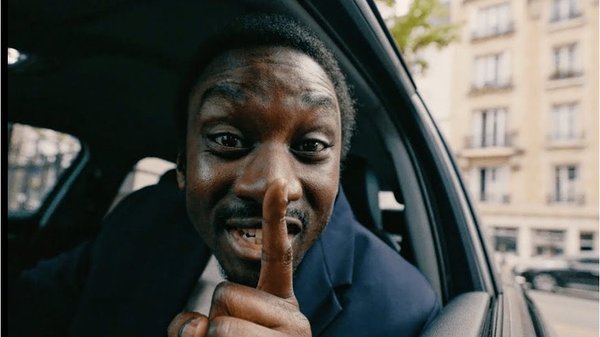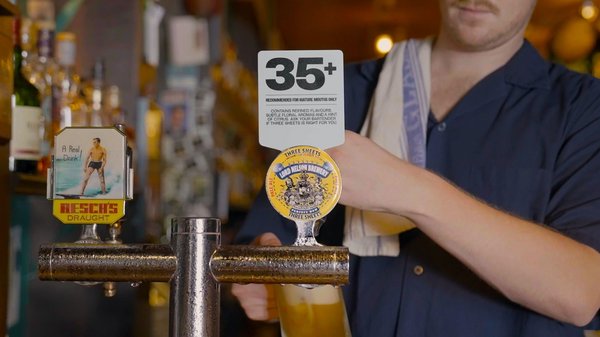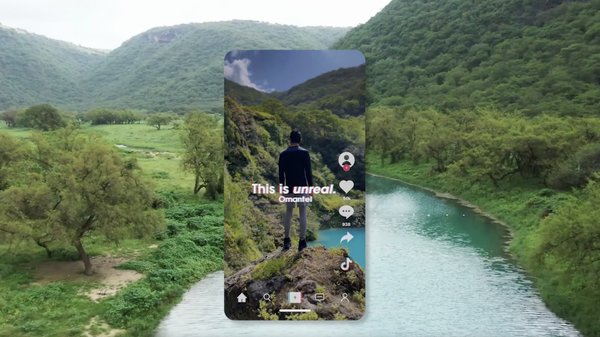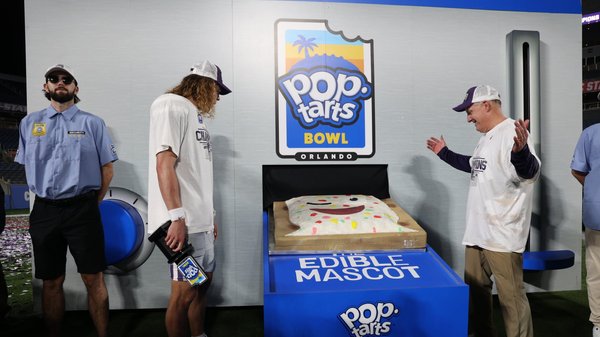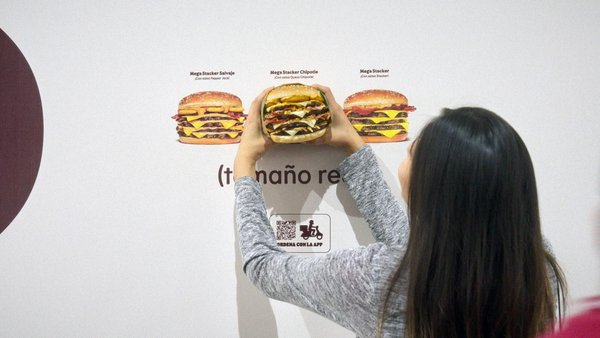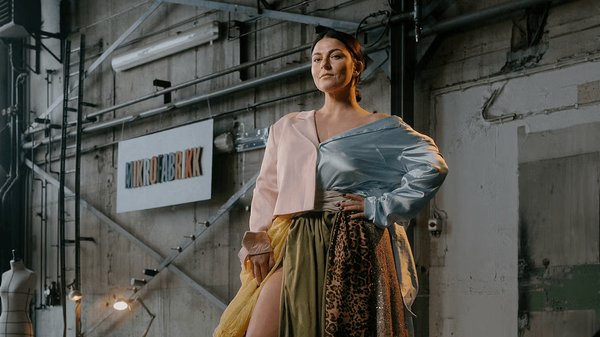Every Super Bowl, there’s one brand that refuses to play by the high-budget, celebrity-fueled rules. In 2020, Reddit brought us Superb Owl, and in 2022 cryptocurrency market platform Coinbase stole the show with Less Talk, More Bitcoin, created with Accenture Song, New York.
The one-minute ad was simple, a QR code bouncing around a black screen. The QR code changed colour every time it hit an edge, mimicking the oft-memed DVD logo that was a source of frustration for anyone with a DVD player in the 00s – because the logo would never slide perfectly into the corner of the screen.
Viewers had to scan the QR code to get any more information. If they did, they were taken to Coinbase’s website, where they could sign up for an account and claim $15 worth of Bitcoin for free. They could also enter Coinbase Drops, a competition to win up to $3m more. The TV ad was complemented by a social media post saying ‘Now that we have your attention we’d like to announce that we're giving away $15 in BTC to anyone who joins Coinbase by 2/15’ [ie, before the end of Super Bowl Sunday].
More than 20 million people scanned the QR code during the ad broadcast, 445,000 new users signed up, and the brand saw more than a 300% increase in brand consideration. Less Talk, More Bitcoin also won the Direct Grand Prix at the 2022 Cannes Lions Festival.
Results update 23/5/2023: The campaign won a Gold Pencil in Creative Effectiveness at The One Show 2023.
We spoke to Accenture Song’s chief creative officer Jason Kreher and brand lead for North America Alex Woods about the campaign, to find out how this unconventional ad came about. They told us:
They had the budget for a blow-out spot, they just chose not to use it
Coinbase has to strike a balance between being a brand people can trust with their money while also communicating like an internet-native company from an anti-establishment sector
It took so long to find an idea that Coinbase liked, they only had three weeks to pull this spot together
Despite being the market leader of the crypto category, Coinbase’s aim for this spot was to drive awareness and name recognition
What was the brief?
Alex Woods: This is a category [crypto] that was getting a lot of hype and a lot of buzz, and Coinbase are the leader of that category. They saw the Super Bowl as an opportunity to help mainstream it. It’s really as simple as that, they wanted to move from a niche market to a mass market. So, for us, the brief was always really about getting people to join in. It wasn't just a splashy brand manifesto statement, it was actually driving some sort of participation, that was always the stated goal of it.
So, they wanted to bring crypto to the mainstream, in a way that was more of a back-and-forth interaction rather than just a spot?
Woods: Yeah, we talked about it in terms of participation, rather than just engagement. Likes, posts, retweets is what a lot of brands talk about when they come to a creative agency asking for engagement, but we knew that wasn’t what we needed to do here. We needed to get people to try this thing out. Maybe people find crypto scary, so we needed to get them over that hump.
Were there any specific business objectives or KPIs?
Woods: Yes, but only in the sense of brand health. It is the Super Bowl, so the expectations are always around how do you drive awareness? How do you change perception? How do you increase familiarity and preference? Those were really the salient KPIs that were laid out for us in the initial brief, but we were curious to see if we could move beyond them.

Jason Kreher: I think also the unspoken KPI when you're in the Super Bowl is an outsized share of attention. It’s the biggest, splashiest, most paid-attention-to moment. And while it's not a business objective that's written down and tied to numbers, there is an assumption when you go into Super Bowl that you want to be the one that people are talking about, especially in a category like that [crypto].
There were actually a lot of ads for crypto companies at the Super Bowl this year, likely all with a similar mainstreaming focus. Were you expecting that? Did you do anything to stand out from that crowd specifically?
Woods: It wasn't a surprise. The way that it all works, you almost know every single advertiser in the game in advance. But on the morning of the Super Bowl, we heard that we were one of only two or three ads that hadn't been released prior to the game, and Coinbase hadn't formally committed itself or announced itself as even advertising in the game. So, we were quite aware of what our competitors were likely to be doing and we were actually the dark horse in the race.
Jason Kreher, Accenture Song
Kreher: The thing that ended up being what made this the most special is that context. There are a lot of crypto companies talking, they talk a lot, with a lot of words, but Coinbase is different.
It's the Super Bowl, there are a lot of celebrities, there are a lot of explosions, people get hit in the stomach, and they fall, and their pants fall down. There's a formula, so you know what to expect from the Super Bowl, and you can't wait to see how they're going to use this celebrity and what hilarious thing this brand is going to do, and so on. So, going into it, we knew that the way to stand out was to be different.
So I do think that it’s not just the context of there being other crypto companies in the Super Bowl, but the context of the Super Bowl itself and the deep knowledge of how you’re supposed to do a Super Bowl ad, was what set it up to work.
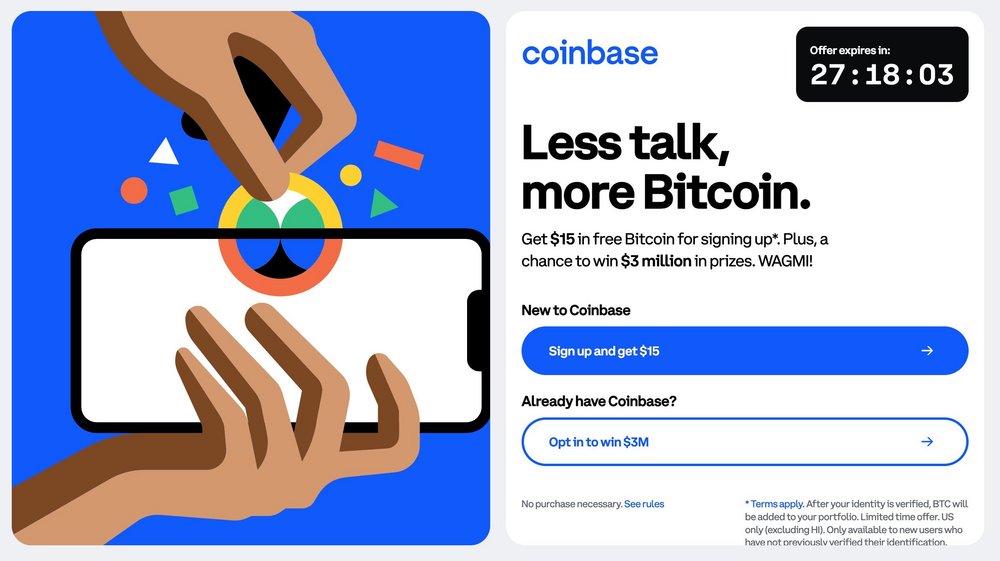
A QR code doing the old DVD icon corner dance was definitely a way to break the mold. How did you come up with the idea? Were there any other contenders?
Kreher: With everything that do in my career, I like to figure out how to hack the expectations of something, it's the only way that I know how to stand out, by surprising people. And humour is my favourite way to do that. But when it’s not humorous, showing up in an unexpected way is a way to grab people’s attention.
On where the idea came from, at a certain point, we were running out of time, and a new thing that came up was Sweepstakes [Coinbase hosts regular Sweepstakes, lotteries where new users can win between $100 and $50,000 worth of crypto]. That was something that already really helps promote participation, engagement, and gets people excited. We knew we needed to get people to the website, and QR codes are used in drops, so we built this idea around Coinbase Drops.
I have to be honest, sure this was a big fancy spot and we won a Grand Prix, but it was a very simple get-to-the-idea thing. I don’t want to diminish how amazing I am, but it was a pretty simple idea: let’s get people to the site, a QR code is the way to do it.
Then we had to figure out how to do it, and the DVD thing came up on one of the first days of discussion. We also had an idea of doing a live spot, with an artist drawing the QR code, and then you could snap it, but the more we talked the more we wanted it to be absolutely dead simple. Show this thing for 60 seconds. It was one of those ideas where, when you think of it, you chuckle and write it down, but then you stop thinking about it because there’s no way anyone is going to buy it, it’s too ridiculous, 60 seconds of no one talking – we all know what you’re supposed to do in a Super Bowl spot – but we sold it.
Alex Woods, Accenture Song
How did you pitch it to them?
Kreher: We walked in with one idea, and our whole beginning was, here are the rules of how you do a Super Bowl spot, high production value, make sure there’s one celebrity, maybe a talking animal, definitely loads of words because you’re spending loads of money so you’ve got to make sure each word makes an impact. Then we just crossed them all out and said ‘Here’s a QR code that’s going to make people go to your website’ and they bought it.
Everybody’s got cool ideas, this is an idea that is as dead simple as it gets, but it’s really hard to feel comfortable buying that on such a big stage – and, to their credit, they did it.
This idea wouldn’t have worked in any other context. If it was 30 seconds, it wouldn’t have worked. If it was on at the Emmys, it wouldn’t have worked because no one cares, there’s no expectation or frenzy around it. It’s simplicity, in this context, was the reason it was so effective, and the audacity for it to go on for so long, it was like an oasis of weird in this everything’s-so-fast moment.
Woods: We looked at tonnes of ideas, and the fact that this was 60 seconds and the fact that it was so untraditional is what makes it so effective. Obviously, it drove a lot of action, drove a lot of conversions and signups, but if you just isolated it as a brand action, it actually expresses a lot about what Coinbase believes: action over words or hot air, showing up differently, bucking institutional norms and expectations, thinking outside of the box. So, as odd and different as it was, it felt wonderfully perfect for them specifically.
As a market leader they’re not technically a challenger brand, but this spot takes a challenger-style approach. Were they looking specifically to do something unconventional?
Kreher: They knew that they wanted to do the Super Bowl for a long time, and it became clear that as a company saying something for the first time on a big stage, a traditional ad, even a non-traditional, funny, super cool ad, they were just allergic to it.
There were a lot of great ideas presented that were super funny. We had time and budget, all of that, it wasn’t a last-minute hail Mary right at the beginning, we just had to figure out what we wanted to say. The more we got to know this client, the more we got into their DNA, we realised that they are fucking the system. And they are in a challenger category versus institutions that are longstanding, and you can’t show up against an institution by acting how an institution acts.
At the end, I think we had three weeks left, still without an idea, and the spot came, we made it, and we shipped it, and that ended up feeling like the best use of it. It engaged everybody, it galvanised everybody internally at the company, and it felt like it ended up how it should have, even though it took a while to get there.
Also, and this is something no one knows, we weren’t even going to have a Coinbase logo, we wanted 60 pure seconds of QR code, and Coinbase was cool with it. For NBC legal reasons, we ended up having to have one. But my client was brave enough to roll in and spend money on a Super Bowl 60 and not even have their logo on it.
Jason Kreher, Accenture Song
Who were you targeting?
Woods: Everyone. We genuinely expected that people who were more tech-forward were more likely to act, but you're playing to the Super Bowl. That’s part of the challenge of that brief, knowing the expectations and knowing that people are watching the game for the ads, you want to delight as many people as possible.
What are Coinbase’s biggest challenges right now? How did this spot address them?
Woods: The primary reason to be in the Super Bowl was purely for building awareness. Yes, we're probably all tech savvy enough to know of Coinbase, but a lot of people are still unfamiliar with what they do and what they believe. So we were primarily trying to drive name recognition.
Kreher: Also, in a category where there are lots of players, and a lot of confusion, the simplicity and confidence that came from the spot is the same simplicity and confidence Coinbase offers as a company; they're the simple way to do crypto. They’ve been around for a decade, and this kind of confidence can only come from a company that is confident in their product.
We ended up with Less Talk, More Bitcoin. The best way to get into crypto is to do it, and we were psyched about this one. Sometimes you get an offer from a client and it’s not that compelling, but this is compelling. You could win money, but also everybody gets $15 of Bitcoin to start trying. The ability to say, ‘Just get in there and try it,’ is a huge driver. And the number of people who scanned it was like 20 million, and that’s shocking. And then hundreds of thousands of people signed up for this. Signup is significant because you have to scan your driver’s license, so while people were eating chips at the Super Bowl they were typing in their social security numbers. It was a genuine surprise for Coinbase of how big of a deal it was.
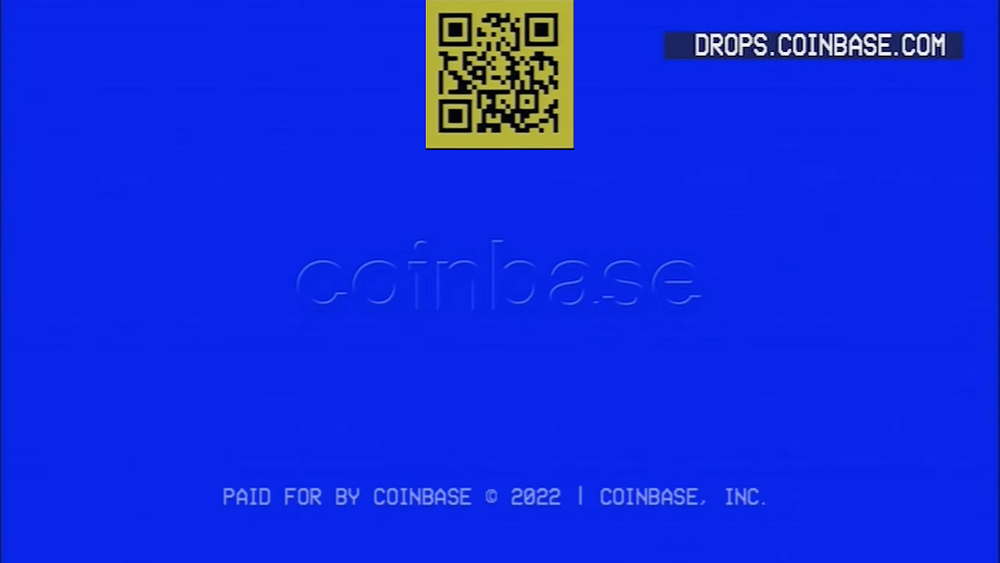
The DVD aspect of it is super nostalgic, but not in the usual Super Bowl nostalgia way, where they bring in a celebrity who was in your favourite childhood TV show and make them do a TikTok dance. Were you thinking about nostalgia as a strategy? And were you intentionally trying to do nostalgia differently?
Kreher: Yes, very much so but I actually wouldn't say it’s nostalgia, I’d say it's internet savvy, because the internet loves not only nostalgia, but also subverting expectations, especially aesthetically. You have to remember, this is a big, giant company that needs to be trusted, so it can’t be goofy. And internet-native companies like Coinbase have to be savvy to what’s going on.
At this company, we talk about relevance all the time. You can’t just be relevant for the ad category, especially with a category like this, you have to be relevant to how people are. That lo-fi aesthetic, ugly, pixelated, seven-colour thing, wasn’t Coinbase’s brand guidelines. We knew that people who know what a QR code is and are comfortable enough invest in cryptocurrency, are going to relate to this type of nostalgia, this type of aesthetic, so we wanted to make it authentic to how something would show up on the internet. You’ve seen the memes where the DVD logo hits the corner and a stadium of soccer fans erupts – so it’s part of the fabric of culture.
That’s an interesting point about how Coinbase can’t be goofy because they are asking people to trust them with their money, how did you balance that?
Kreher: You can get attention by kicking somebody in the nuts, people do it all the time on the Super Bowl. But that's not right for a company you're supposed to trust with your money and trust to have stability.
It comes back to the client again, and their confidence in their product. With this spot they are saying, ‘We’re stable, confident and we’ve been here for a decade, so we can be this simple and not constantly ask for attention.’
What would you say to people who don’t view this spot as ‘creative’?
Kreher: Everybody is so fatalistic about it, they’re like ‘This is the end of craft.’ But this was the right thing, at the right moment, and for the right client. I love doing that for a client when it’s right, but I don’t have any more QR code commercials in the chamber. This wouldn’t have worked anywhere else, for any other length of time, or at any other moment in time.
Were there any budget restraints involved?
Kreher: No, and the free crypto and prizes were separate from our budget too. They were ready to do a Super Bowl spot. It just so happened that the right thing wasn’t super expensive. When we pitched it, I couldn’t believe I was going to walk into a meeting with this inexpensive commercial, you’re supposed to spend as much money as you can on the Super Bowl.
We did invest in rigorous testing because we wanted to make sure people could see if from across the bar on an old TV. One thing that people don’t take into account budget-wise is UX, and making sure this worked on a 22-year-old square television, as well as a big movie screen at a Super Bowl party. So we had the budget for a Super Bowl spot, but it was still probably the cheapest one ever made – maybe not as cheap as the Reddit one.
Were you at all inspired by the Reddit Superb Owl spot from the previous year?
Kreher: I love being compared to that because both {spots] just did not do what was expected of them. But did that inspire me for this? No. What inspired me is every time somebody does something that’s unexpected and right of the moment – that’s how I, as a creative, look at every assignment. What do the people watching expect to see? And how do we show up in a way that surprises and delights them by not doing any of that?
Did you ever consider not having the QR make it into the corner and really upsetting everyone?
Kreher: We had long discussions about it. The level of thought we put into it is disproportionate because it’s like a little hero’s journey. You have this QR code and you’re rooting for it after a while. So we did talk about cutting it off right because it goes into the corner and making people go ‘uachhhhh’, but ultimately we knew everybody was waiting for it and we wanted to give them that satisfaction.
Right after the Super Bowl, Coinbase’s CEO caused some controversy when he publicly said there was no agency involved in the campaign – what did you think of that?
Woods: We worked really closely with Kate [Rouch, Coinbase CMO] and her team, there's no doubt that we were heavily involved with the advertisement. But there was an army of people at Coinbase working on everything as well. I mean, they were prepared for the volume of traffic that they got from the Super Bowl and pulled off of giant mass Sweepstakes. In totality, there was a lot that went into it, so we get the sentiment.

